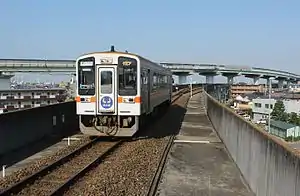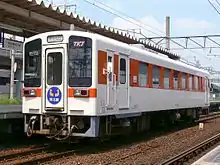Tōkai Transport Service Jōhoku Line
The Jōhoku Line (城北線, Jōhoku-sen) is a Japanese commuter rail line between Kachigawa Station in Kasugai and Biwajima Station in Kiyosu in Aichi Prefecture. Trains are operated by Tokai Transport Service Company, or TKJ in short, while its rail facilities belong to Central Japan Railway Company (JR Central). TKJ, a wholly owned subsidiary of JR Central, operates this line.
| Jōhoku Line | |
|---|---|
 A TKJ KiHa 11-300 series diesel car on the Johoku Line in May 2016 | |
| Overview | |
| Native name | 城北線 |
| Status | Operational |
| Owner | JR Central |
| Locale | Aichi Prefecture, Japan |
| Termini | Kachigawa Biwajima |
| Stations | 6 |
| Website | www |
| Service | |
| System | JR Central |
| Operator(s) | Tokai Transport Service Company (TKJ) |
| Rolling stock | KiHa 11 DMUs |
| Daily ridership | 1,384 (FY2009) |
| History | |
| Opened | 1 December 1991 |
| Technical | |
| Line length | 11.2 km (7.0 mi) |
| Track gauge | 1,067 mm (3 ft 6 in) |
| Minimum radius | 400 m |
| Electrification | Not electrified |
| Operating speed | 95 km/h (59 mph) |
Services
All trains stop at all stations, and there are no limited stop rapid services. Services operate once per an hour in daytime, and 2 or 3 times per an hour in the morning and evening.[1]
Stations
All stations are in Aichi Prefecture.
| Station | Japanese | Distance (km) | Transfers | Location |
|---|---|---|---|---|
| Kachigawa | 勝川 | 0.0 | Chuo Main Line | Kasugai |
| Ajiyoshi | 味美 | 1.8 | ||
| Hira | 比良 | 4.5 | Nishi-ku, Nagoya | |
| Otai | 小田井 | 6.7 |
| |
| Owari-Hoshinomiya | 尾張星の宮 | 9.3 | Kiyosu | |
| Biwajima | 枇杷島 | 11.2 | Tokaido Main Line | |
Rolling stock
The line is operated using a fleet of four KiHa 11 single-car diesel multiple unit DMUs.[2]
When the line first opened, services were operated using KiHa 40 series single-car DMUs leased from JR Central. These were painted in the TJK livery of cream with orange window band.[3]
Up until April 2015, the fleet consisted of four KiHa 11-200 series cars (KiHa 11-201–204), based at Kachigawa Depot.[4] Two of these (KiHa 11-203 and 204) were sold to the Hitachinaka Kaihin Railway in Ibaraki Prefecture in April 2015.[4] KiHa 11-201 was withdrawn from Johoku Line services on 23 September 2015, and sold to the Hitachinaka Kaihin Railway. It was replaced from 24 September 2015 by KiHa 11-300 series car KiHa 11-301, purchased from JR Central.[5] The remaining KiHa 11-200 series car (KiHa 11-202) was scheduled to be replaced by a KiHa 11-300 series car in 2016.[6]
 A KiHa 11-200 series car in August 2006
A KiHa 11-200 series car in August 2006 KiHa 11-301 in service in December 2015
KiHa 11-301 in service in December 2015
History
The line was originally planned by Japanese National Railways (JNR) in the 1960s as a freight-only line linking the Chuo Main Line at Kachigawa with the Tokaido Main Line at Biwajima.[2] Construction began in March 1976, but was subsequently halted due to the huge deficit of JNR.[2] The line consisted of two separate sections, one between Setoshi and Kōzōji, and another between Kachigawa and Biwajima. Construction of the both sections resumed later, as passenger lines, but by different operators. The former section, the current Aichi Loop Line, was succeeded by Aichi Loop Railway, while the latter, the current Jōhoku Line, was succeeded by JR Central and TKJ. The first section of the Jōhoku Line, between Kachigawa and Owari-Hoshinomiya, opened on 1 December 1991.[2] The section between Owari-Hoshinomiya and Biwajima opened on 18 March 1993.[2]
Passenger statistics
In fiscal 2009, the line was used by an average of 1,384 passengers daily.[2]
See also
References
- "KACHIGAWA - BIWAJIMA Interval Timetable".
- Terada, Hirokazu (19 January 2013). データブック日本の私鉄 [Databook: Japan's Private Railways] (in Japanese). Japan: Neko Publishing. p. 115. ISBN 978-4-7770-1336-4.
- JR全車輛ハンドブック'93 [JR Rolling Stock Handbook 1993] (in Japanese). Japan: Neko Publishing. 1993. p. 331.
- 私鉄車両編成表 2015 [Private Railway Rolling Stock Formations - 2015] (in Japanese). Japan: Kotsu Shimbunsha. 23 July 2015. p. 94. ISBN 978-4-330-58415-7.
- 城北線でキハ11-301デビュー [KiHa 11-301 debuts on Johoku Line]. Tetsudō Daiya Jōhō Magazine (in Japanese). Vol. 44 no. 380. Japan: Kōtsū Shimbun. December 2015. p. 78.
- 営業車両の購入について [Purchase of new passenger rolling stock] (in Japanese). Japan: Tokai Transport Service Company. September 2015. Archived from the original on 8 September 2015. Retrieved 6 January 2016.
External links
| Wikimedia Commons has media related to Tokai Transport Service Jōhoku Line. |
- TKJ official website (in Japanese)
.svg.png.webp)